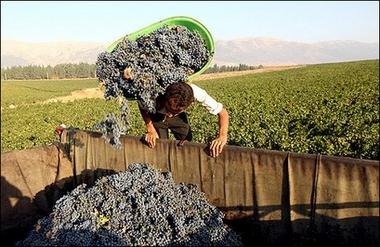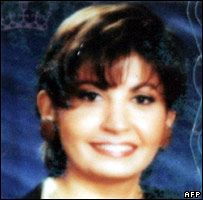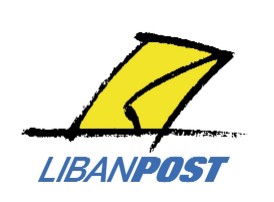 KHIRBET QANAFAR, Lebanon (AFP) - Lebanon Bekaa Valley is gaining a new reputation as a wine-making region increasingly attractive to vintners. More than a dozen labels have appeared on the market since the end of the country's 1975-1990 civil war with each vying for recognition among the growing crop of New World wines.
KHIRBET QANAFAR, Lebanon (AFP) - Lebanon Bekaa Valley is gaining a new reputation as a wine-making region increasingly attractive to vintners. More than a dozen labels have appeared on the market since the end of the country's 1975-1990 civil war with each vying for recognition among the growing crop of New World wines.
And judging by the awards some of the wines are receiving at international fairs, they are holding their ground amid stiff competition and peaking the interest of connoisseurs. "The Lebanese wine industry today produces about seven million bottles annually out of which some three million are exported," said Serge Hochar, head of the Union Vinicole du Liban, a loose association of wine producers.
"It is a 25-million-dollar industry out of which about 10 million dollars represent exports."That is more than triple the receipts of the mid 1990s when the wine sector began taking off after the devastating years of war.At the time, the lush Bekaa Valley, known in Roman times as the breadbasket of the world and home to a Roman temple dedicated to Bacchus, the god of wine, was synonymous with guerrilla activity and hashish rather than wine making.
DAMASCUS (AFP) Oct 14-- Syrian President Bachar Assad slammed Lebanese who he said had chosen to side with Israel and submit themselves to foreigners instead of taking the Arab path and that of resistance.
In an interview published on Thursday, Assad said of the neighbouring nation where it was powerbroker for nearly three decades: "It is impossible to build a relationship with some parties who in Lebanon ... are close to Israel, submit themselves to foreign countries and do not believe in Lebanon."
He told the Tunisian daily al-Shuruk, in an interview reprinted in official Syrian media: "Most of the forces who hold power in Lebanon have adopted this position which rebounds on Syrian-Lebanese relations."
 MICHAEL ASTOR, Associated Press Writer Fri Oct 12, 12:47 PM ET, RIO DE JANEIRO, Brazil - Brazil's Supreme Court denied a Lebanese request to extradite a fugitive banker accused of a multimillion-dollar bank fraud and wanted for questioning in the assassination of former Lebanese Prime Minister Rafik Hariri.
MICHAEL ASTOR, Associated Press Writer Fri Oct 12, 12:47 PM ET, RIO DE JANEIRO, Brazil - Brazil's Supreme Court denied a Lebanese request to extradite a fugitive banker accused of a multimillion-dollar bank fraud and wanted for questioning in the assassination of former Lebanese Prime Minister Rafik Hariri.
Victor Mauad, attorney for Rana Koleilat, said Friday his client is waiting for her passport to be returned and that she had been given eight days to leave the country once it is. "She doesn't know where she will go yet, probably some country in Europe," Mauad said in a telephone interview, adding his client has both British and Lebanese citizenship. "She's looking for a safe place. She's worried for her life."
Koleilat was jailed on fraud charges in Lebanon in 2004, but fled the country. She was arrested in Sao Paulo on March 12, 2006, for allegedly trying to bribe police officers who located her for Interpol. Police said at the time she offered a US$200,000 (euro140,000) bribe for her freedom. Mauad said she had been acquitted of the Brazilian bribery charges and was released from jail Wednesday. He declined to say where she was staying because she fears for her safety.
 Oxford Business Group 2007 Liban post and government officials signed an agreement at the end of September that is expected simplify the business registration process in Lebanon. The International Finance Corporation (IFC)
Oxford Business Group 2007 Liban post and government officials signed an agreement at the end of September that is expected simplify the business registration process in Lebanon. The International Finance Corporation (IFC) , a member of the World Bank Group, worked with the government to design the new process. The initiative was the result of one of eight advisory programmes undertaken by the IFC in an effort to restart the economy following the summer war of 2006.
The new business registration process, aimed at making the set up of a business simpler, cheaper and faster, is anticipated to be launched by the end of this month. Currently, registering a business involves numerous trips to government offices, various fees and a large amount of paperwork. The initiative is being touted by the government as likely to reduce the overall time, cost and complexity of the process by almost half and to cut the number of steps and trips to government offices from the current 12 to 17 down to a maximum of six.
"The reform sends a very positive message to the private sector and entire investment community," said Thomas Mouillier, IFC regional program manager for business regulatory reforms. Efforts were made to standardise the process by making it possible to register a new business with a single form that can be submitted to any branch of Libanpost, Lebanon's official mail service network, along with the necessary fees.
Khazen History


Historical Feature:
Churches and Monasteries of the Khazen family

St. Anthony of Padua Church in Ballouneh
Mar Abda Church in Bakaatit Kanaan
Saint Michael Church in Bkaatouta
Saint Therese Church in Qolayaat
Saint Simeon Stylites (مار سمعان العامودي) Church In Ajaltoun
Virgin Mary Church (سيدة المعونات) in Sheilé
Assumption of Mary Church in Ballouneh
1 - The sword of the Maronite Prince
2 - LES KHAZEN CONSULS DE FRANCE
3 - LES MARONITES & LES KHAZEN
4 - LES MAAN & LES KHAZEN
5 - ORIGINE DE LA FAMILLE
Population Movements to Keserwan - The Khazens and The Maans
ما جاء عن الثورة في المقاطعة الكسروانية
ثورة أهالي كسروان على المشايخ الخوازنة وأسبابها
Origins of the "Prince of Maronite" Title
Growing diversity: the Khazin sheiks and the clergy in the first decades of the 18th century
Historical Members:
Barbar Beik El Khazen [English]
Patriach Toubia Kaiss El Khazen(Biography & Life Part1 Part2) (Arabic)
Patriach Youssef Dargham El Khazen (Cont'd)
Cheikh Bishara Jafal El Khazen
Patriarch Youssef Raji El Khazen
The Martyrs Cheikh Philippe & Cheikh Farid El Khazen
Cheikh Nawfal El Khazen (Consul De France)
Cheikh Hossun El Khazen (Consul De France)
Cheikh Abou-Nawfal El Khazen (Consul De France)
Cheikh Francis Abee Nader & his son Yousef
Cheikh Abou-Kanso El Khazen (Consul De France)
Cheikh Abou Nader El Khazen
Cheikh Chafic El Khazen
Cheikh Keserwan El Khazen
Cheikh Serhal El Khazen [English]
Cheikh Rafiq El Khazen [English]
Cheikh Hanna El Khazen
Cheikha Arzi El Khazen
Marie El Khazen